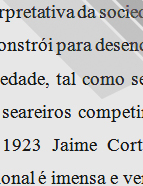

................................
After the war (1914-1918), the harsh confrontation between Cortesão and Sérgio in the early days of Águia faded almost to the point of disappearing. The role of historical knowledge in underpinning the reformative activity desired by Seara Nova may be found in both. This role is much less visible in Raul Proença, although not ignored — one need only recall how he immediately embraced Sérgio’s argument in the essay on the capture of Ceuta. (Amaro, A Seara, p. 65). Despite differences in interpretation and an emphasis on distinct characteristics, the seareiros were in agreement on the urgency of halting the decline in which the nation was mired. They invoked the severe flaws of the nation’s past that could be said to be structural. Later frustrations would lead to a more complex and explanatory interpretation of the past.
According to Sérgio and the seareiros (who the essayist joined in 1923), the conception of the past of the nation always involve d a critical view of the structure of the State, emphasi s ing the negative role played by the dominant social groups over the populace. As a young seareiro wrote : “Tradition in Portugal is the communal parasitism of the State, the formidable imbalance of professions which has led to the wastage of our natural resources, and this tradition has long been diagnosed as the main Portuguese disease.” (Castro, À margem [On the Margin], p. 2). Even the triumph of the bourgeoisie in 1383 paradoxically resulted in the rise and predominance of the literate class, “at once an effect and a cause of social parasitism.” He concludes on this second period: “The nation, therefore, never educated itself in the discipline of work, having been prematurely absorbed into the mercantile specialty of trade speculations, intimately linked to the work of the Cavalry; this fact, the ruin of the former nobility, the worsening of agricultural poverty, and the corresponding parasitism of the literati and bureaucracy, are the chief characteristics of the new regime inaugurated by the social revolution of 1383-1385.” (Sérgio, Considerações [Considerations], p p. 16, 18, and 19-20).
